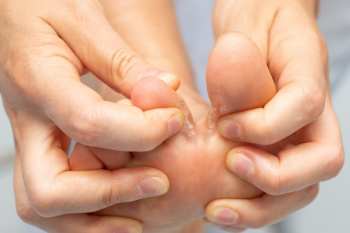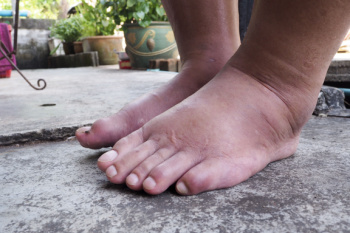Connect With Us
Blog
Items filtered by date: March 2025
Thursday, 27 March 2025 00:00
Arthritis Can Cause Pain in the Feet and Ankles
Tuesday, 25 March 2025 00:00
Tips for a Smoother Stride While Running With Arthritis

Arthritis can make running difficult, but the right adjustments help reduce pain and keep you active. Wearing the right footwear is essential. Well-cushioned, supportive running shoes or custom orthotics absorb shock and improve stability, reducing strain on arthritic joints. Modifying your stride and running surface can also make a big difference. Shortening your stride and landing on the midfoot instead of the heel helps lessen the impact on knees and hips. Choosing softer surfaces like grass or a rubberized track instead of concrete minimizes stress on joints. Preparing your body before and after a run is equally important. Warming up with gentle movement and stretching before running improves flexibility while cooling down and elevating the feet helps control inflammation. If your arthritis is interfering with comfortable running, it is suggested that you visit a podiatrist for personalized advice and support.
Arthritis can be a difficult condition to live with. If you are seeking treatment, contact Carrie Frame, DPM from West Virginia Foot & Ankle. Our doctor can provide the care you need to keep you pain-free and on your feet.
Arthritic Foot Care
Arthritis is a joint disorder that involves the inflammation of different joints in your body, such as those in your feet. Arthritis is often caused by a degenerative joint disease and causes mild to severe pain in all affected areas. In addition to this, swelling and stiffness in the affected joints can also be a common symptom of arthritis.
In many cases, wearing ill-fitting shoes can worsen the effects and pain of arthritis. Wearing shoes that have a lower heel and extra room can help your feet feel more comfortable. In cases of rheumatoid arthritis, the arch in your foot may become problematic. Buying shoes with proper arch support that contour to your feet can help immensely.
Alleviating Arthritic Pain
- Exercises that stretch the foot can prevent further pain and injury and increase mobility
- Most of the pain can be alleviated with anti-inflammatory drugs, heat, and topical medications
- Massages can help temporarily alleviate pain.
It is best to see your doctor for the treatment that is right for your needs and symptoms. Conditions vary, and a podiatrist can help you determine the right method of care for your feet.
If you have any questions, please feel free to contact our office located in Charleston, WV . We offer the newest diagnostic tools and technology to treat your foot and ankle needs.
Tuesday, 18 March 2025 00:00
The Role of Dermatophytes in Athlete’s Foot

Athlete's foot is a skin infection caused by dermatophytes, a type of mould-like fungus. These tiny organisms thrive in warm, damp environments, such as locker rooms, public showers, and sweaty athletic shoes. When feet remain moist for long periods, dermatophytes can easily invade the skin, leading to irritation, itching, and redness between the toes and the soles. The fungus may spread rapidly if not properly treated, resulting in discomfort and persistent infections. Maintaining dry feet, wearing breathable footwear, and practicing good hygiene can help prevent this condition. Early signs include mild scaling and burning sensations. Recognizing the symptoms and acting quickly can reduce the risk of further complications. If discomfort continues or the infection worsens, it is suggested that you see a podiatrist for proper diagnosis and appropriate treatment.
Athlete’s Foot
Athlete’s foot is often an uncomfortable condition to experience. Thankfully, podiatrists specialize in treating athlete’s foot and offer the best treatment options. If you have any questions about athlete’s foot, consult with Carrie Frame, DPM from West Virginia Foot & Ankle. Our doctor will assess your condition and provide you with quality treatment.
What Is Athlete’s Foot?
Tinea pedis, more commonly known as athlete’s foot, is a non-serious and common fungal infection of the foot. Athlete’s foot is contagious and can be contracted by touching someone who has it or infected surfaces. The most common places contaminated by it are public showers, locker rooms, and swimming pools. Once contracted, it grows on feet that are left inside moist, dark, and warm shoes and socks.
Prevention
The most effective ways to prevent athlete’s foot include:
- Thoroughly washing and drying feet
- Avoid going barefoot in locker rooms and public showers
- Using shower shoes in public showers
- Wearing socks that allow the feet to breathe
- Changing socks and shoes frequently if you sweat a lot
Symptoms
Athlete’s foot initially occurs as a rash between the toes. However, if left undiagnosed, it can spread to the sides and bottom of the feet, toenails, and if touched by hand, the hands themselves. Symptoms include:
- Redness
- Burning
- Itching
- Scaly and peeling skin
Diagnosis and Treatment
Diagnosis is quick and easy. Skin samples will be taken and either viewed under a microscope or sent to a lab for testing. Sometimes, a podiatrist can diagnose it based on simply looking at it. Once confirmed, treatment options include oral and topical antifungal medications.
If you have any questions, please feel free to contact our office located in Charleston, WV . We offer the newest diagnostic and treatment technologies for all your foot care needs.
Tuesday, 11 March 2025 00:00
Diseases That Can Cause Swollen Feet

Swollen feet can be a sign of underlying health conditions that affect circulation, fluid balance, or inflammation. Heart disease can lead to fluid retention in the lower extremities due to poor circulation and weakened heart function. Kidney disease affects the body’s ability to remove excess fluids, resulting in swelling in the feet and ankles. Liver disease can cause fluid buildup when the liver fails to produce enough proteins to regulate circulation. Additionally, diabetes may lead to swelling due to poor circulation and nerve damage. Severe infections can cause localized swelling as the body responds to inflammation. Arthritis often results in joint swelling and stiffness, making movement painful. If your feet have become swollen, it is strongly suggested that you consult a podiatrist who can determine what the cause is, and offer appropriate treatment and relief solutions.
Swollen feet can be a sign of an underlying condition. If you have any concerns, contact Carrie Frame, DPM of West Virginia Foot & Ankle. Our doctor can provide the care you need to keep you pain-free and on your feet.
Swollen feet are a common ailment among pregnant women and people who stand or sit for extended periods. Aging may increase the possibility of swollen feet and patients who are obese often notice when their feet are swelling too. There may be medical reasons why swollen feet occur:
- Phlebitis - A condition that causes the veins to become inflamed and can also cause leg pain.
- Liver disease - This may lead to low blood levels of albumin which is a protein. This can cause fluid in the blood to pass into the tissues and several areas of the body can become swollen.
- Heart failure - When the heart doesn’t pump properly the blood that is normally pumped back to the heart can pool in the veins of the legs causing swollen feet.
- Kidney disease - One of the main functions of the kidneys is releasing excess fluid in the body. This type of condition can make it difficult for the kidneys to function properly, and as a result the feet may become swollen.
- Deep-vein thrombosis (DVT)- This is a serious condition where blood clots form in the veins of the legs. They can block the return of blood from the legs to the heart which may cause the feet to swell. It is important to be treated by a podiatrist if this condition is present.
Swollen feet can also be caused by bone and tendon conditions, including fractures, arthritis, and tendinitis. Additionally, there may be skin and toenail conditions and an infection may cause the feet to swell. Patients who take medicine to treat high blood pressure may be prone to getting swollen feet.
Many patients elevate their feet to help relieve the swelling and this is generally a temporary remedy. When a podiatrist is consulted the reason behind the swelling can be uncovered and subsequently treated.
If you have any questions please feel free to contact our office located in Charleston, WV . We offer the newest diagnostic tools and technology to treat your foot and ankle needs.
Tuesday, 04 March 2025 00:00
Causes and Prevention of Plantar Warts

Plantar warts are small, rough growths that appear on the soles of the feet, often causing discomfort or pain when walking. They are caused by a viral infection, specifically the human papillomavirus, or HPV, which enters the skin through small cuts or abrasions. The virus thrives in warm, moist environments, making places like public showers, swimming pools areas, and gym locker rooms common areas for infection. To prevent plantar warts, it is essential to avoid walking barefoot in public spaces and to keep feet clean and dry. Wearing moisture-wicking socks and well-fitting shoes can also help minimize the risk. If you have developed a plantar wart, it is suggested that you promptly schedule an appointment with a podiatrist who can provide safe and sterile medical care for relief and removal.
Plantar warts can be very uncomfortable. If you need your feet checked, contact Carrie Frame, DPM from West Virginia Foot & Ankle. Our doctor will assist you with all of your foot and ankle needs.
About Plantar Warts
Plantar warts are the result of HPV, or human papillomavirus, getting into open wounds on the feet. They are mostly found on the heels or balls of the feet.
While plantar warts are generally harmless, those experiencing excessive pain or those suffering from diabetes or a compromised immune system require immediate medical care. Plantar warts are easily diagnosed, usually through scraping off a bit of rough skin or by getting a biopsy.
Symptoms
- Lesions on the bottom of your feet, usually rough and grainy
- Hard or thick callused spots
- Wart seeds, which are small clotted blood vessels that look like little black spots
- Pain, discomfort, or tenderness of your feet when walking or standing
Treatment
- Freezing
- Electric tool removal
- Laser Treatment
- Topical Creams (prescription only)
- Over-the-counter medications
To help prevent developing plantar warts, avoid walking barefoot over abrasive surfaces that can cause cuts or wounds for HPV to get into. Avoiding direct contact with other warts, as well as not picking or rubbing existing warts, can help prevent the further spread of plantar warts. However, if you think you have developed plantar warts, speak to your podiatrist. He or she can diagnose the warts on your feet and recommend the appropriate treatment options.
If you have any questions please feel free to contact our office located in Charleston, WV . We offer the newest diagnostic and treatment technologies for all your foot and ankle needs.

